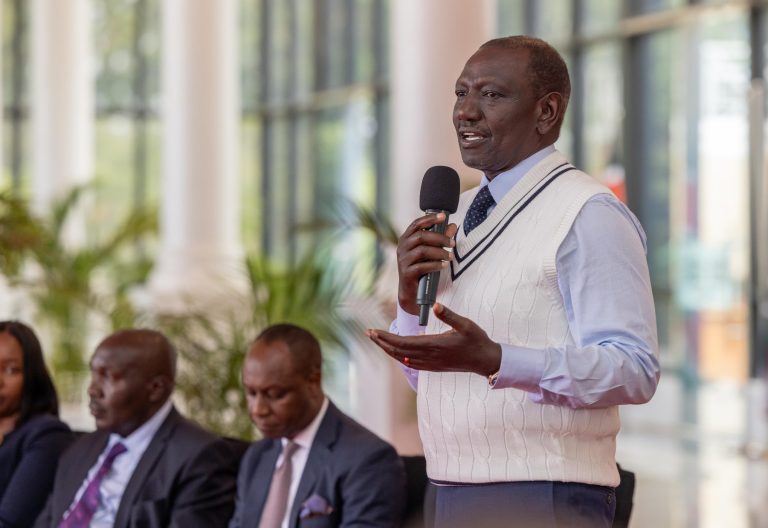Ruto is toying with the health of Kenyans

The statement that many Kenyans are one sickness away from poverty is dropped whenever there is a discussion on the healthcare systems in the country.
Politicians never miss the opportunity to utter it too, especially when raising their perks and saying that they need higher pay because they clear hospital bills of their voters.
While they use that statement as a justification to bleed Kenyans dry, they fly out to seek treatment because healthcare services in those countries are better and less costly.
As a matter of fact, cost is never an issue, considering that our elected politicians have medical insurance schemes with an almost infinite cover that includes air fare and accommodation for family members who accompany them.
While elected leaders seek medical care in other countries because Kenya’s healthcare services are not improving, for the poor, the services are also unaffordable.
It was never meant to be this way, though. Things were supposed to be better, since the current administration promised to enhance healthcare provision so Kenyans can have access to better and affordable medical care.
In June 2022, then Deputy President William Ruto, while unveiling his party’s health manifesto, said that “30 percent of our population is one sickness away from poverty. That is too much of a risk. We must do whatever it takes to sort out our health issues.”
He became president a few months later, and ever since, the groans of sick Kenyans and their families have become louder, only drowned out by the cries of healthcare workers over working conditions and unfulfilled promises of better pay, among other problems his administration has refused to resolve.
President Ruto’s government has also been fumbling and bumbling over the Social Health Insurance Fund, a scheme he touted as the panacea for all sicknesses and healthcare service provision for the country to attain Universal Health Coverage (UHC).
The UHC, which was being piloted by the previous administration, is itself a victim of reactive policy decisions, considering the number of Cabinet secretaries the Health Ministry has had since Ruto came to power.
Each Cabinet Secretary who steps into Afya House has no solutions for previously unresolved issues and also has to deal with new problems caused by their missteps and those of their predecessors.
The current Health Cabinet Secretary Aden Duale wants to transfer payroll responsibilities of 8500 odd UHC medical workers to counties, a move that the Council of Governors (CoG) has rejected.
Apparently, 8571 workers were hired in 2020 to boost human resources during the COVID-19 pandemic, with promises that they would be assimilated under permanent and pensionable terms into the UHC workforce.
They have been surviving on what can be considered a stipend, taxable of course, and with the Ruto administration levying taxes every second, their take-home pay has reduced, yet their gratuities remain unpaid.
While Ruto and his apparatchiks talk big on healthcare provision, they do not want to take responsibility, making one wonder how the much-touted UHC—which he hurriedly launched—will be attained without human resources, what with the administration obsessed with securing jobs in European and Gulf countries for Kenyan medics.
Wajir Governor Ahmed Abdullahi, who is the CoG chair, has called out the national government, saying it is transferring a problem it caused and cannot handle to the counties, as it continues to disrespect the constitutional provisions concerning the implementation of the policies it wants the counties to undertake.
He said the CoG does not see the urgency of transferring the UHC workers’ payrollto the counties, and the CoG Health Committee chair Muthomi Njuki, said CS Duale is giving them a sharp knife while holding the handle, and they cannot accept that.
In the meantime, a report indicates that the one-hospital-bill-away-from-poverty situation will likely be affected further by the withdrawal of the United States from the World Health Organisation, a move that will hamper some of the government’s health programmes.
According to the Institute of Public Finance’s (IPF) Macro-Fiscal Analytic Report, released three months ago, Kenya’s consolidated health budget decreased by seven per cent in real terms between 2018/2019 and 2022/2023 financial years.
It mentions the reduction in the health budget as a share of GDP from 2.1 per cent to 1.6 per cent and a fall in real per capita terms from Sh5,597 to Sh4,791 in 2023, and notes that the fall in budgetary allocation falls short of international benchmarks, thus, Kenya’s dream of attaining UHC will be a nightmare.
There is enough proof that the Ruto administration is toying with the health of Kenyans through poorly thought-out policy decisions, and he is not ready to do whatever it takes to sort out our health issues as he promised on the campaign trail.
— The writer is the Managing Editor of the Alliance for Science (AfS). These views are solely his and do not necessarily reflect the position of AfS or its partners














